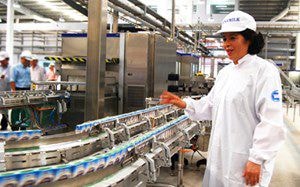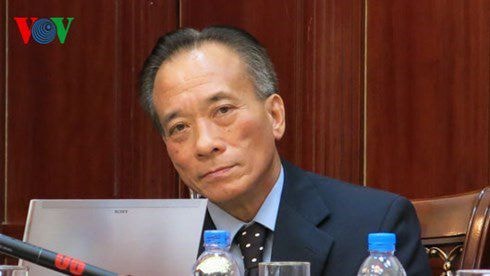State capital divestment in 10 enterprises: Opportunity for "big guys" to break out
For businesses, divesting state capital may result in losing advantages in policy incentives, but this will be a golden opportunity to break out.
The Government has just decided to divest all State capital shares in 10 large enterprises, including: Vietnam Dairy Products Joint Stock Company (Vinamilk - 45.1%), Bao Minh Joint Stock Corporation (BMI - 50.7%), Vietnam National Reinsurance Joint Stock Corporation (VNR - 40.4%), Tien Phong Plastic Joint Stock Company (NTP - 37.1%), Binh Minh Plastic Joint Stock Company (BMP - 38.4%), Vietnam Infrastructure and Real Estate Joint Stock Company (47.6%), Ha Giang Mechanical and Mineral Joint Stock Company (HGM - 46.6%), Sa Giang Import-Export Joint Stock Company (SGC - 49.9%), FPT Joint Stock Company (FPT - 6%) and FPT Telecommunication Joint Stock Company (FTC - 50.2%).
 |
| The government decided to divest all capital from Vinamilk. |
PV:The Government has just decided to divest from 10 enterprises, what do you think about this decision? Talking to VOV reporter, economic expert Nguyen Chi Hieu said that the Government's policy of divesting State capital from 10 enterprises is completely correct. For enterprises, it may lose the advantage of incentives and policies, but this will be a golden opportunity for enterprises to have full authority and initiative to decide their business and investment strategies.
 |
| Economist Nguyen Chi Hieu |
Expert Nguyen Chi Hieu:In my opinion, this is a very drastic move by the Government in divesting capital from enterprises. Vietnam is entering the final stage of its 5-year development but the process of restructuring state-owned enterprises is still slow. Therefore, it is reasonable for the Government to use all measures to accelerate this process.
There are many opinions that the expectation is to get 3-4 billion USD from divestment, but whether that expectation is possible or not depends on the market.
PV:So, to get the best results from the divestment process, what kind of plans and options do we need to develop, sir?
Expert Nguyen Chi Hieu:Up to now, the Government has not yet issued a specific plan to divest capital from 10 enterprises. However, the Government has certainly worked with the State Capital Investment Corporation (SCIC), ministries, departments and branches to come up with a detailed plan. However, the overall and specific details of when SCIC will divest capital from enterprises, at what cost, and in which market are still unknown.
The government has only recently announced the divestment policy. The government needs to specify the programs so that economic sectors, people, and even foreign investors can participate in bidding to buy those shares and stocks. The policy is correct, but there must be an agency to implement this program, such as SCIC or the State Securities Commission, or the Ministry of Finance, the Ministry of Planning and Investment, etc.
PV:Are budget balancing difficulties one of the reasons why the Government made that decision at this time, sir?
Expert Nguyen Chi Hieu:The divestment was planned in advance, but due to the slow progress, the Government has only now come up with a more drastic solution. In addition, difficulties in balancing the budget are also one of the reasons. In the past, the Government issued bonds to attract capital, but the success rate was not high while the need to repay debt was high, and the drop in oil prices increased budget pressure.
PV:From a business perspective, after divestment, do you think those businesses will benefit more?
Expert Nguyen Chi Hieu:This is a good opportunity for businesses to go it alone. If the divestment program is completed, the private sector will take over the role of the Government in managing these businesses. We know that in a market economy, there is nothing better than “giving back to the private sector what belongs to the private sector”. The government takes on the role of managing the entire economy, only managing a number of industries that are important to the country.
PV:Are businesses worried about losing advantages in terms of incentives and policies?
Expert Nguyen Chi Hieu:For businesses, this is a golden opportunity for them to implement management according to the market economy. However, I also understand that for business leaders, this is a terrible change of life because up until now, they have had State capital so they have been "preferred"... After divestment, they have to fend for themselves, no more policy incentives...
Besides, enterprises operating in a market economy must do business systematically and compete with all enterprises. Therefore, I also understand the anxiety from business leaders to employees. But in my opinion, this is an opportunity for them to be proactive in their business development strategies.
PV:How will divestment from these enterprises affect attracting foreign investors, sir?
Expert Nguyen Chi Hieu:A company that operates efficiently and has good financial reports is certainly more beneficial in attracting foreign investment than state-owned enterprises. Of course, there are foreign investors who target enterprises with preferential policies, but gradually those preferential policies will have to disappear, especially when Vietnam joins the TPP and other FTAs. For example, the TPP has strict provisions requiring state-owned enterprises to give up preferential policies, creating a level playing field for all economic sectors./.
According to VOV
| RELATED NEWS |
|---|

